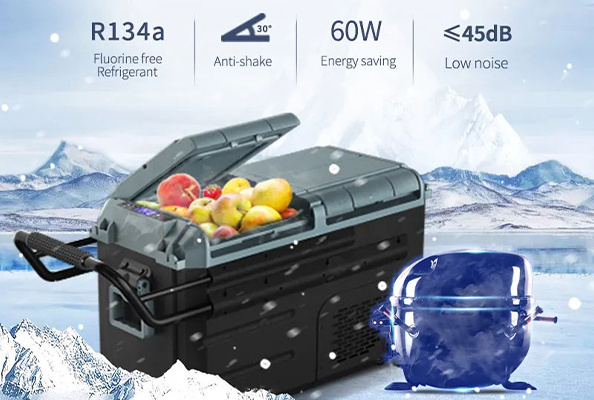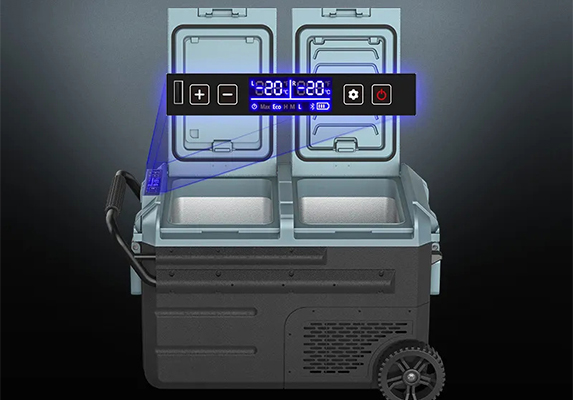The choice between a portable fridge and a solar-powered refrigerator depends on your specific needs and circumstances.
Here are some factors to consider when deciding between the two:
1. Power Source
Portable fridges typically run on electricity from a standard power outlet or a 12V power source like a car battery. They are convenient for short-term use or when a power source is readily available. On the other hand, solar-powered refrigerators are designed to operate solely on solar energy, making them suitable for off-grid or remote locations where access to electricity is limited.
2. Portability
Portable fridges are designed to be lightweight and easy to transport. They are commonly used for camping trips, road trips, or other outdoor activities. Solar-powered refrigerators are generally larger and heavier, making them less portable. They are more suitable for semi-permanent or stationary installations.
3. Energy Efficiency
Solar-powered refrigerators are designed with energy efficiency in mind. They are engineered to optimize the use of solar energy and minimize power consumption. On the other hand, portable fridges may not be as energy-efficient, especially when running on a battery or a car’s power source. However, advancements in technology have led to more energy-efficient portable fridge models.
4. Cooling Capacity
Portable fridges come in various sizes, ranging from small coolers to larger units with substantial cooling capacity. They offer flexibility in terms of cooling options and can cool items relatively quickly. Solar-powered refrigerators also come in different sizes, but their cooling capacity may be limited by the solar panels’ output. If you require a large cooling capacity, a portable fridge might be a better choice.
5. Cost
Portable fridges are generally more affordable compared to solar-powered refrigerators. Solar-powered refrigerators require an initial investment in solar panels, batteries, and other related equipment. However, they can provide long-term cost savings by relying on solar energy instead of grid electricity.
In summary, if you need a portable cooling solution for short-term use and have access to a power source, a portable fridge would be a suitable choice. On the other hand, if you require refrigeration in off-grid or remote locations and are willing to make an upfront investment, a solar-powered refrigerator can offer sustainable and independent operation. Consider your specific requirements and preferences to make the best choice for your needs.

Some key considerations to help you choose between a portable fridge and a solar-powered refrigerator:
Power Availability: Determine the availability of power sources in your intended usage location. If you have easy access to electricity, a portable fridge can be a convenient option. If you’re in an off-grid or remote area with limited access to power, a solar-powered refrigerator might be more suitable.
Duration of Use: Consider the duration of your cooling needs. If you require short-term cooling for a few hours or days, a portable fridge can serve your purpose. For longer-term cooling needs, especially in places without electricity, a solar-powered refrigerator’s sustainable operation becomes advantageous.
Mobility: Assess your need for mobility and portability. If you’re frequently on the move, such as for camping or road trips, a portable fridge’s lightweight and compact design make it a practical choice. If you need a more stationary solution for a fixed location, a solar-powered refrigerator’s larger size and weight may be acceptable.

Cooling Requirements: Determine the amount of cooling capacity you need. If you require a larger cooling capacity or the ability to cool items quickly, a portable fridge with its wide range of sizes and cooling capabilities may be more suitable. Solar-powered refrigerators may have limitations on cooling capacity depending on the solar panels’ output and the system’s design.
Energy Efficiency: Consider the energy efficiency aspect. Solar-powered refrigerators are designed to optimize energy consumption and rely solely on renewable solar energy. They are more environmentally friendly and can save on long-term electricity costs. Portable fridges may not be as energy-efficient, especially when running on batteries or car power sources.
Budget: Evaluate your budget for the initial investment and long-term costs. Portable fridges are generally more affordable upfront, while solar-powered refrigerators require an initial investment in solar panels, batteries, and related equipment. However, solar-powered refrigerators can provide long-term cost savings by utilizing solar energy instead of grid electricity.
By considering these factors, you can determine which option aligns best with your specific needs, location,and budge.
Final Thought:
Who doesn’t want to enjoy the best of both worlds?
With the Renhotec Portable Solar Fridge, you get a portable fridge that can operate and recharge using AC and DC electricity and the solar energy.
Compact design with lightweight, fast cooling and freezing capabilities, expandable storage, and all the convenience of refrigeration that you can take on the go in one innovative appliance.

Here are some advantages of using a portable solar fridge:
- Energy Independence. A portable solar fridge allows you to be self-sufficient and independent of grid electricity. You can enjoy refrigeration capabilities even in remote locations or during power outages.
- Environmentally Friendly. Solar-powered fridges utilize renewable energy from the sun, reducing reliance on fossil fuels and minimizing your carbon footprint. They help contribute to a cleaner and more sustainable environment.
- Portability and Versatility. Portable solar fridges are designed to be lightweight and easy to transport, making them ideal for camping, RVing, boating, picnics, and other outdoor activities. They offer flexibility and convenience, allowing you to keep your food and beverages cool wherever you go.
- Cost Savings. While the upfront cost of a portable solar fridge may be higher than traditional fridges, they offer long-term cost savings. By harnessing solar energy, you can avoid ongoing electricity expenses, especially in off-grid or remote areas where connecting to the grid may be expensive or impractical.
- Quiet Operation. Portable solar fridges typically have quiet operation, which is particularly beneficial for camping or RV trips where noise can be disruptive. You can enjoy a peaceful environment without the constant hum of a traditional fridge or generator.
- Durability and Reliability. Portable solar fridges are designed to withstand outdoor conditions and are built with rugged materials. They are often more durable than regular fridges, making them suitable for outdoor adventures and harsh environments.
- Longer Food Storage. With a portable solar fridge, you can keep perishable items fresh for an extended period. This is especially useful when camping or traveling to areas where fresh food availability is limited.
- Low Maintenance. Portable solar fridges typically have low maintenance requirements. With no need for fuel or frequent electrical connections, you can enjoy hassle-free operation with minimal upkeep.
- Emergency Preparedness. Having a portable solar fridge as part of your emergency preparedness kit ensures you can keep essential medicines, food, and water cold during power outages or natural disasters.
- Positive Health Impact. With a portable solar fridge, you can maintain safe food storage temperatures, reducing the risk of spoilage and foodborne illnesses. This is particularly important in outdoor settings where access to refrigeration may be limited.
These advantages highlight the practicality, sustainability, and convenience offered by portable solar fridges in various situations.

FAQ About Portable Solar Fridges:
Q1: What is a portable solar fridge?
A portable solar fridge is a refrigerator that operates using solar energy as its primary power source. It is designed to be compact and lightweight, making it easy to transport and suitable for outdoor activities, camping, RVing, or off-grid living.
Q2: How does a portable solar fridge work?
A portable solar fridge consists of solar panels, a charge controller, batteries, and a compressor or thermoelectric cooling system. The solar panels capture sunlight and convert it into electrical energy, which is stored in the batteries. The charge controller regulates the flow of power and prevents overcharging. The stored energy is then used to power the fridge’s compressor or cooling system, keeping the contents inside cold.
Q3: How efficient are portable solar fridges?
The efficiency of portable solar fridges can vary depending on the model and the quality of components used. However, modern portable solar fridges are designed to be energy-efficient, utilizing advanced insulation materials and compressor technology to minimize power consumption. Additionally, advancements in solar panel technology have improved the efficiency of solar energy conversion, resulting in better overall performance.
Q4: Can a portable solar fridge work without sunlight?
A portable solar fridge requires sunlight to generate electricity from the solar panels. However, many portable solar fridges are equipped with batteries that store excess energy during sunny periods. These batteries can power the fridge during periods of low sunlight or even at night, providing continuous cooling.
Q5: How long can a portable solar fridge run on solar power alone?
The runtime of a portable solar fridge on solar power alone depends on several factors, such as the size of the solar panels, the capacity of the batteries, the ambient temperature, and the fridge’s energy efficiency. Generally, a well-designed portable solar fridge can run for several days on solar power alone, assuming adequate sunlight is available during that period.
Q6: Can I use a portable solar fridge indoors?
Yes, you can use a portable solar fridge indoors as long as you have access to sunlight or a solar energy source. However, keep in mind that the solar panels need to be positioned to receive sufficient sunlight for optimal charging. If you don’t have access to direct sunlight indoors, you may need to consider alternative power sources or use the fridge in conjunction with traditional electrical outlets.
Q7: Are portable solar fridges expensive?
Portable solar fridges tend to be more expensive upfront compared to traditional portable fridges that run on electricity or gas. The cost is primarily due to the inclusion of solar panels, batteries, and other specialized components. However, it’s important to consider the long-term cost savings from using solar energy instead of relying on grid electricity or other fuel sources.
